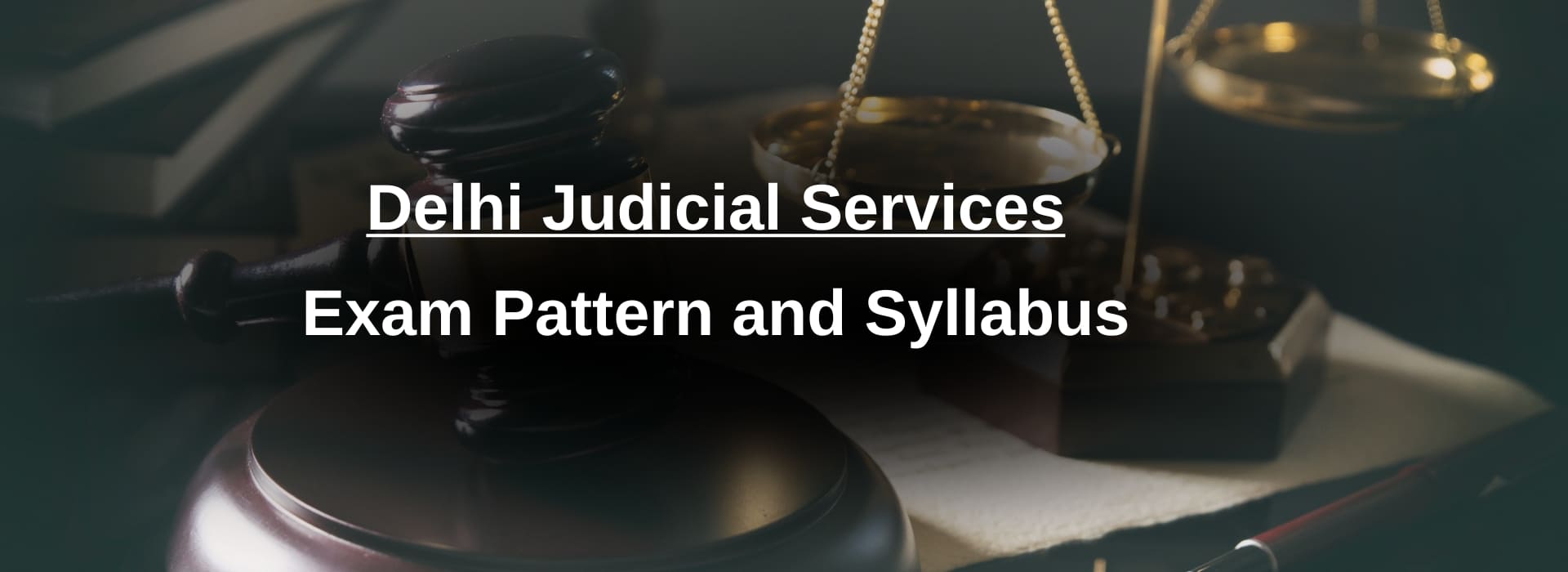
Delhi Judiciary Syllabus 2025 - Prelims, Mains & Interview
The Delhi Judiciary Services Exam 2025 is one of the toughest exams in India for aspiring judges. It's run by the Delhi High Court, and if you're an Indian citizen with a law degree from a recognized university, you're eligible to take it. The exam has three parts: Prelims, Mains, and the Interview.
The Delhi High Court publishes the syllabus every year, which is used to recruit candidates for Civil Judge positions. The Prelims and Mains exams share some topics, but the exam format and questions are different for each stage. Let’s break it down!
What’s Covered in the Delhi Judiciary Exam 2025?
- Complete Syllabus of Delhi Judiciary 2025
- Prelims Syllabus and subjects
- Mains Syllabus
- Interview details
Delhi Civil Judge Exam Syllabus 2025
The exam has three parts:
- Prelims (Objective questions, with negative marking)
- Mains (Written Exam)
- Interview (Viva-Voce)
Delhi Judiciary Prelims Syllabus 2025
The Prelims is the first stage, and it’s a screening test. It’s an objective-type exam that mainly checks your general legal knowledge, ability to express yourself, and understanding of key legal concepts. Here’s what you need to study:
- The Constitution of India
- Code of Civil Procedure (1908)
- Code of Criminal Procedure (1973)
- Indian Penal Code (IPC)
- Indian Contract Act (1872)
- Limited Liability Partnership Act (2008)
- Arbitration and Conciliation Act (1996)
- Indian Evidence Act (1872)
- Specific Relief Act (1963)
- Limitation Act (1963)
- Protection of Children from Sexual Offences Act (2012)
- Commercial Courts Act (2015)
Delhi Judiciary Mains Syllabus 2025
The Mains is the second stage and is a written exam that tests your deeper understanding of the law. It has four papers:
- General Legal Knowledge & Language
- Civil Law I
- Civil Law II
- Criminal Law
Mains Paper Details:
General Legal Knowledge & Language This section has two parts:
- General Knowledge: Questions about current legal issues.
- Language: Focuses on English skills like essay writing, translation, and précis writing. You’ll need to translate passages from Hindi to English and vice versa.
Civil Law I (200 marks):
Covers topics like:
- Indian Contract Act (1872)
- Sale of Goods Act (1930)
- Hindu Law, Mohammedan Law
- Law of Torts, Delhi Rent Control Act
- Commercial Courts Act (2015)
Civil Law II (200 marks):
Topics include:
- Code of Civil Procedure (1908)
- Indian Evidence Act (1872)
- Limitation Act (1963)
- Arbitration and Conciliation Act (1996)
Criminal Law (200 marks):
Includes:
- Code of Criminal Procedure (1973)
- Indian Penal Code (IPC)
- Protection of Women from Domestic Violence Act (2005)
- Juvenile Justice Act (2015)
Delhi Judiciary Interview Syllabus
The final stage is the Viva-Voce (Interview). This part tests your understanding of legal matters, how well you communicate, and your reasoning ability. The interview may ask questions based on your legal knowledge and how you apply it to real-life situations.
- For the general category, you need at least 50% in the interview to be eligible for selection.
- For the reserved category, you need at least 45% to qualify.
The final merit list is based on the marks from both the Mains exam and the Interview.
In Summary:
- The Delhi Judiciary Exam tests your knowledge of the Indian legal system and general law.
- It’s important to have a strong understanding of the law and current legal affairs to do well in the exam.
- The syllabus is split into Prelims (objective questions), Mains (written exam), and Interview (Viva-Voce).
- The Mains exam covers a wide range of legal topics, and the Interview evaluates your legal knowledge and communication skills.